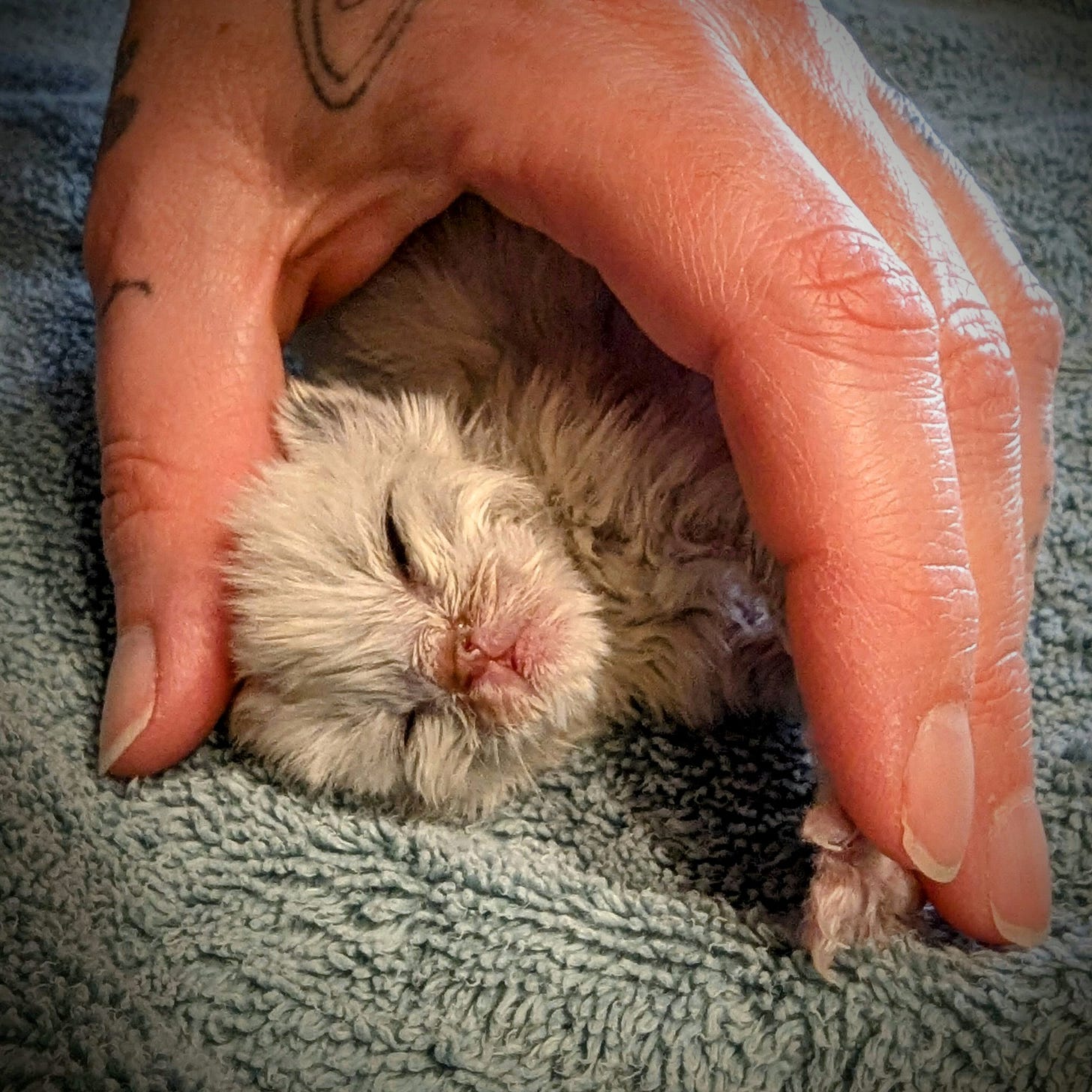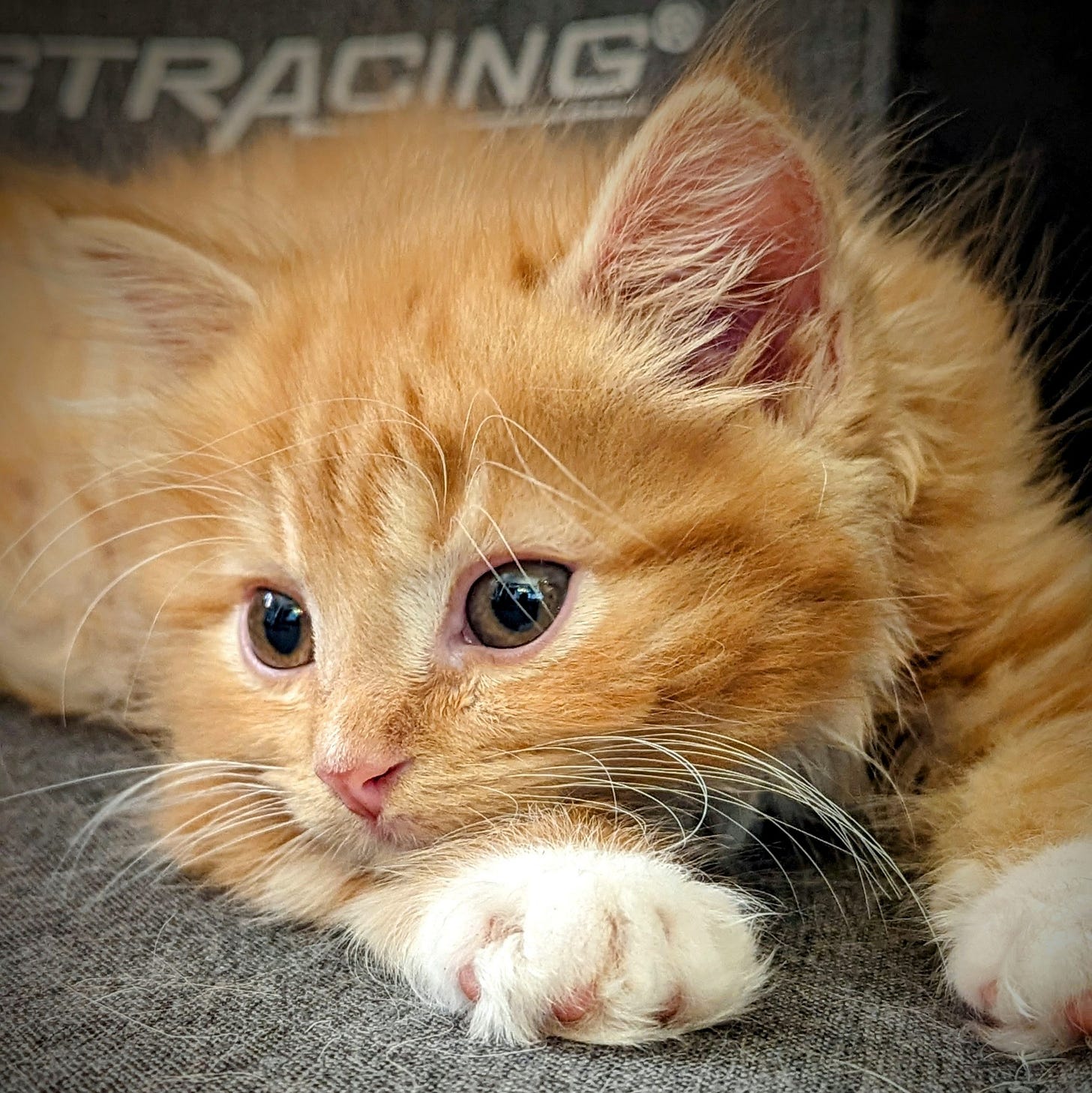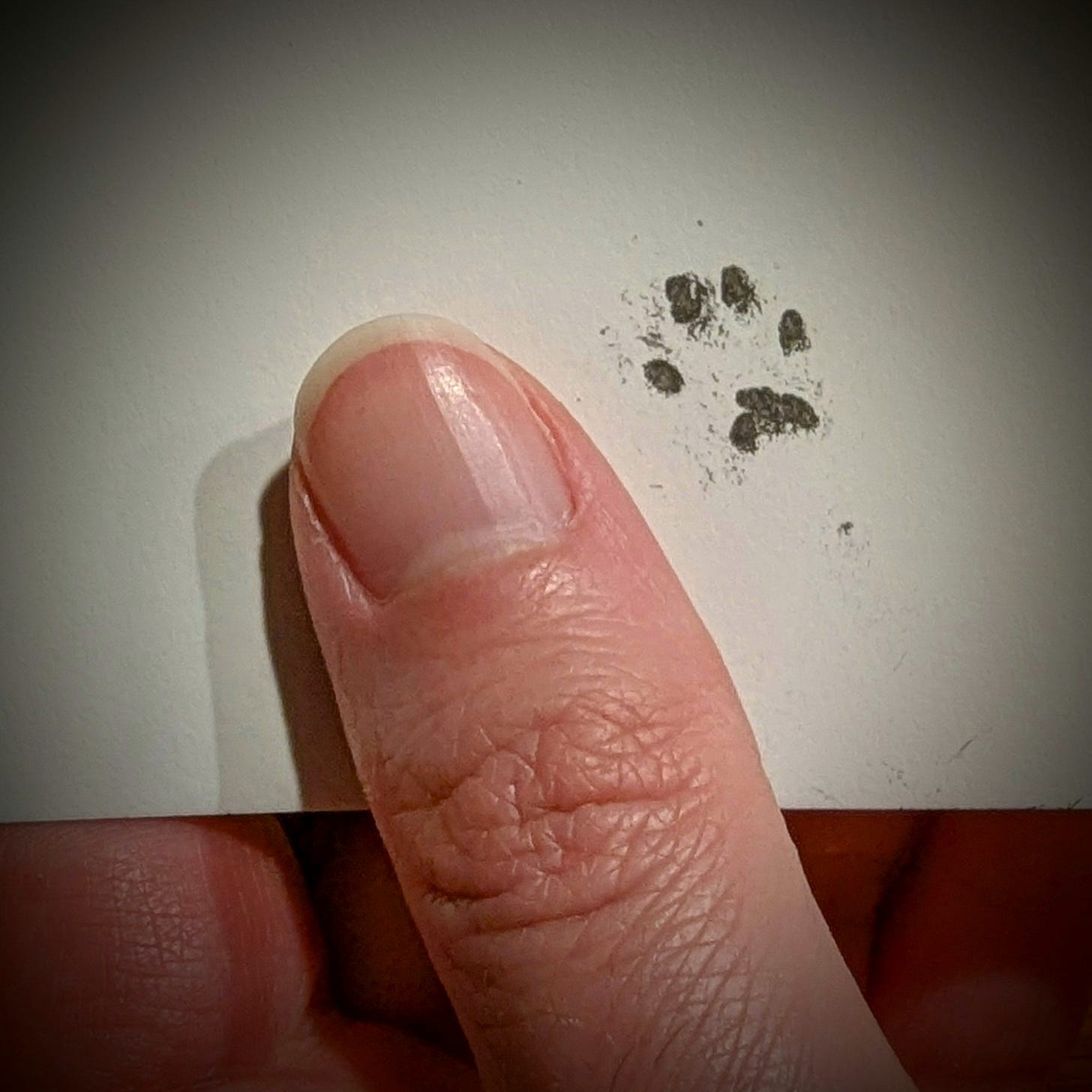When Rescue Means Letting Go
Reflections on love, loss, and resilience in animal rescue work.
Trigger Warning: Grief, Loss, Death, and Dying.
Little Moe came to us at seven days old, not eating, not thriving, not able to nurse. These are the hardest cases. Anyone in rescue will tell you that very young, very tiny kittens are incredibly fragile. I’ve heard lots of estimates, but it’s generally agreed that around 30% of kittens this small will survive once orphaned. But that doesn’t mean we don’t try.
I foster in order to help that cat/dog or litter have a better chance at life. – Nancy, 9 years fostering
I won’t get into the details, the feedings every two hours, the worry over her bowels, the constant vigilance of “is she still breathing” that comes with this kind of care. The exhaustion. She made it to day twelve before her little system declared it just couldn’t keep going. That’s five days of round-the-clock care provided by four very skilled fosters.
It wasn’t enough.
And that’s a hard pill to swallow. Sometimes, you can care with your whole heart and pour in everything you have, and it still isn’t enough. You can do everything right and still lose them.
I think if you are a person who cares about others struggling, there will never not be heartache. – Kaylin, 11 years fostering
Grief is a river that runs through our lives. Sometimes it’s a trickle, barely visible among the reeds of life. At other times, it’s a raging torrent that feels like it will sweep us away entirely. No one is exempt from this river. It flows through us and connects us.
The first time you experience it, it feels like it will drown you. The current is swift, and it’s hard to keep your head above water. Eventually, you’re spit out on the shore, wet, breathless, and shaken. But the thing about grief that makes it unique is that it’s never isolated. Every time you experience grief, you’re dropped back into the river, surrounded by the currents of all the grief that has come before.
If you’ve ever felt like your response to a small loss is out of measure, I suspect it’s because your grief river is already running high.
Little Moe passed peacefully, surrounded by excellent veterinary care and fosters who loved her. It’s incredible how much impact five days can have on your heart. She’s not the first foster I’ve lost, and she won’t be the last. It seems crazy, putting your heart on a chopping block over and over again. I tell people that fostering keeps me emotionally limber. It’s definitely not for everyone.
I keep fostering, knowing that there will be loss and heartbreak, because I know that I will save more lives than I will lose. – Sophia, 4 years fostering
Here’s another universal truth about grief: the only way out is through. We don’t talk about it, which is interesting for something we all experience. It’s so easy to feel alone or invalidate your process when, in reality, we all experience many of the same thoughts and emotions. We talk about the stages of grief, but no one remembers them when they’re struggling, cycling through, or stuck in one place.
Cedar seemed like she would be a successful bottle baby story. She thrived and grew and moved on to her forever home with many kisses and happy tears. But a heart defect took her within a month. The loss knocked the wind out of me, even though she was no longer in my care. I couldn’t stop crying. It would hit me at weird times in unconnected places. The sadness seemed bottomless. I had a little medallion made with a cat carved on the front and her name on the back so I could wear her close to my heart. It helped.
My #1 tip for managing loss is to allow myself to grieve fully. I make sure my environment is set up to support that process—whether it’s quiet time, a comforting space, or even just time to reflect. I give myself grace to feel whatever emotions come up without rushing through them. Creating a keepsake, like a picture or memento, helps me hold onto their memory in a meaningful way. – Jen, 15+ years fostering
Processing our grief is essential to keeping the river below flood levels, so the next inevitable loss doesn’t drown us when it knocks us off our feet. And that’s really the key. It isn’t about keeping upright. This isn’t a how-to guide on keeping grief from overwhelming you. If anything, it’s the opposite. I believe you have to let grief pull you under if you have any hope of resurfacing.
Many years ago, when our children were little, my partner almost died rock climbing over a waterfall. A misplaced handhold and a root that wasn’t attached to anything turned into a frantic battle with the whirlpool below. The force of the water kept pushing him away from the surface, into the watery depths. It wasn’t until he let it push him down that he was able to resurface and ultimately escape the hungry pull of the water.
Grief is much this way. If we resist it, don’t allow it to pull us under, it doesn’t diminish. The water line rises, and it waits for the next time we’re plunged into its depths. We have to let the river take us, send us downstream from who we were before the loss, wash away the debris of things that don’t really matter, and leave us clear-eyed and gasping on the far shore. The gift of grief is clarity. It’s a gift we have to earn.
There’s no “normal” amount of time with which to grieve. And every loss is different. Let yourself fall apart. And then forgive yourself for missing all the things you think you should have done while you were busy picking up the pieces. – Kaylin, 11 years fostering
I feel my grief in my throat, just below my tonsils. It’s big and chokey. I can’t swallow it or spit it out. It’s just stuck there, making it hard to breathe and hard to speak. It grips me by the throat. I’m a nurse, by trade. Caring for animals and caring for people is not so different. Our hearts don’t discriminate based on species. When looking for insight from the people in my world, I found that my community of nurses and animal rescue workers had very similar things to say about what keeps them in a profession filled with loss and heartbreak.
Yes, it hurts to care so deeply, but it also has filled my life with purpose. I stayed because every life I touched, no matter how briefly, leaves a mark on me, and I wouldn’t trade that for anything. – Shawnee, RN 21 years
Everyone who is grieving needs something a little different, but there’s one thing I always make sure to tell every foster who’s lost a kitty.
It’s not your fault. You did everything you could. They were loved.
We blame ourselves relentlessly. When I’m with a foster after a loss, I make them look at me and say it again.
It’s not your fault. You did everything you could. They were loved.
The first time, it bounces off a hard shell of disbelief and shock. The second time, it sticks a little better. The third time, it starts to sink in. I make sure to message them later, when they’re back in the cycle of blame.
It’s not your fault. You did everything you could. They were loved.
This is so important. Another key point is that doing everything you can does not mean that you did everything possible. We are all soft humans with limitations. That’s okay. We do the best we can with what we have in each moment. We cannot do everything all the time. One of the biggest challenges is simply being kind to ourselves. It’s easy to say but very difficult to do.
I know the risks of taking in older cats with health problems, and while it’s really difficult seeing them struggle, I know I’m giving them the best care I can give them. I make sure they know they are loved. – Sarah, 4 years fostering
I’ve struggled with whether I should post pictures of kitties who have since passed. Is there a social contract about only posting healthy, happy, living kitties? I finally asked myself, what’s really holding me back? These cats matter, even if their time with us was short. Their value is not in what they can contribute. It’s simply that they’ve been. You are the same.
I keep fostering, with the full understanding that I will not be able to save them all. I continue even after a loss because that’s part of life. I have to remind myself that if I let the grief swallow me, I will not be able to continue and help others. – Chelsey, 10+ years rescue, fostering, and rehabilitation
When you work in rescue, sometimes kittens are literally handed to you on the street. On a hot day in September, I had three that couldn’t be more than four weeks old in a cardboard box in the passenger seat of my car, rushing them to my most skilled neonatal foster in the hopes we could save them. They were in bad shape. One died in the car on the way there, the second went shortly after I got there, and the third was fading fast. There was a moment, the two of us kneeling on her living room rug, kids playing in the back yard, and a heap of medical equipment strewn out on the hearth, where we looked at each other and shrugged.
“He’s dying,” I said. “Let’s pull out all the stops.”
We did, and he lived.
Sometimes, it works, and that makes all the rest worth it.
Fostering has taught me so much about resilience, love, and the importance of showing up, even when it’s hard. I’ve learned that while loss and heartbreak are inevitable, they don’t diminish the value of the love I give. In fact, they make it even more meaningful. Every time I say goodbye, I’m reminded of how fragile and precious life is, and how important it is to make sure that, even for a short time, an animal feels safe, cared for, and loved. – Jen, 15+ years fostering
A special thank you to everyone who responded to my questions about grief and how we keep going. You are the backbone of rescue work (and nursing), and I love and appreciate each of you.
💛 For less than a bag of catnip, you can help support these stories of love, loss, and second chances, and get a little daily whiskered joy in your inbox. Paid subscriptions start at just $5/month.









We fosters do important work. We save lives. And it is sometimes challenging, heartbreaking and very rewarding all at the same time. And I live with the memory of the lives I’ve helped—and those I have lost. I specialise in feline bottle babies and those with medical problems. I also have a passion for palliative and end-of-life care. I believe wholly in a good beginning, a well-lived life, and a dignified death. And my mission's always been to do just that—honour the cats. Always.
Oh yes yes yes yes yes, and thanks for having the courage to write this.